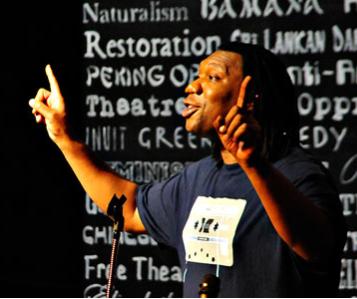The State of Arizona deemed rock band Rage Against the Machine’s lyrics and KRS-One’s hip-hop teachings “illegal” in classrooms last month.
On his last day in office, outgoing Superintendent John Huppenthal issued a “notice of noncompliance” to Tucson Unified School District, where Cholla High Magnet School teachers used the Rage Against the Machine song “Take the Power Back” in Mexican-American history class and KRS-One’s essay on hip-hop in African-American-focused English class.
Under current state legislation, school curricula cannot “advocate ethnic solidarity instead of the treatment of pupils as individuals”—a measure that has already dismantled the Mexican-American Studies program in the Tucson district in 2012, and that effectively makes other such “culturally relevant””courses unlawful.
Thankfully, the ethnic studies ban could not keep KRS-One from sharing his lyrics and experiences with Arizona classrooms. The rap icon visited Cholla High Magnet School last week, giving a lecture to show his support and speaking directly to the students of the African American Literature class. “It’s the responsibility of artists everywhere to do whatever they can to steer young people in some sort of positive direction,” said KRS-One in an interview afterwards, even joking about creating his own Hip-Hop Community College. He believes the controversy has brought the community together because “it wasn’t just hip-hop; it flew right in the face of Native American studies, Mexican studies and African-American studies.”
Meanwhile, Rage Against the Machine guitarist Tom Morello has spoken out on Twitter, claiming that hip-hop is “only dangerous if you teach it right.”
“@Jakov_10: AZ school under fire for teaching about hip-hop, RATM lyrics http://t.co/q2vkonR0bC” It’s only dangerous if u teach it right
— Tom Morello (@tmorello) January 3, 2015
The Republican-dominated Arizona state legislature passed the ethnic studies law in 2010 over concerns of a Mexican-American Studies curriculum in Tucson public schools. Due to pressure from state officials and budget cutbacks, the school board dismantled the program, despite the findings of a 2011 state-commissioned audit that showed the curriculum fostered critical thinking and intercultural proficiency. Dozens of books were removed from classrooms and prohibited from instructional use; among that banned books accused of promoting “the overthrow of the United States government” or “resentment toward a race or class of people” are Shakespeare’s The Tempest, Sherman Alexie’s Ten Little Indians, and Junot Diaz’s Drown. From the beginning, NCAC stood with dozens of national organizations against this brazen censorship, and filed an amicus brief in support of student and teacher plaintiffs who have challenged the law in court.
The Ninth Circuit Court of Appeals heard oral arguments for Arce v. Huppenthal last month, but a new Superintendent of Public Instruction, Diane Douglas, has given Tucson Unified School District until March 4 to remove the ethnic courses or risk losing 10 percent of its funding.
NCAC will continue to monitor the events in Tucson in the hope that students in every school–not just in KRS-One’s dream Hip-Hop Community College–can have the opportunity to engage in critical discussion and learning about race and ethnicity.


